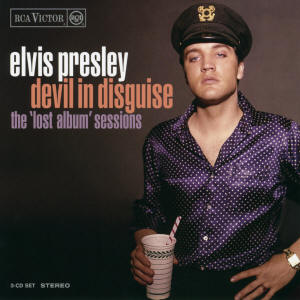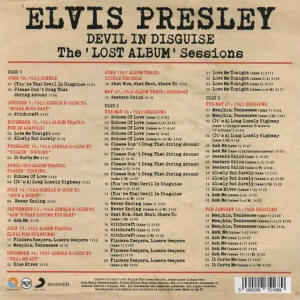(C) Follow That Dream Records / Sony Music Entertainment
On "For The Asking - The Lost Album" and "Elvis Sings Memphis Tennessee" the tracks were sequenced like they could have been on an album of the early 1960s. On the first disc of this boxed set they are sorted by release date.

"(You're The) Devil In Disguise" / "Please Don't Drag That String Around" was released in June 1963. For 11 weeks it could be found on Billboard's "Hot 100" where it peaked at number 3. In the USA the single sold 1.4 million copies and was awarded with Gold in 1992. In many European countries "(You're The) Devil In Disguise" became a top 10 hit, in Great Britain it even made it to the number one of the charts. When BMG released the track again in 2005 it once again became successful and peaked at number 2 of the UK Charts. Worldwide the single sold 2.7 million units, which translates to 405 million paid streams.
(You're The) Devil In DisguiseBill Giant, Bernie Baum and Florence Kaye wrote a lot of mediocre movie songs for Elvis, but this one is neither a movie tune nor mediocre. In fact, it's a very good popsong. The loved one of the singer looks like an angel, but he knows that she's not faithful at all. Florance Kaye came up with the title as Giant and Baum called her daughter an angel. The trio thought it was great and created a song around the expression "devil in disguise". Elvis recorded it on May 26, 1963 at RCA Studio B in Nashville/Tennessee and needed six takes to do so. RCA Records released the track on the album "Elvis' Gold Records - Volume 4" (1968) and on the 4 lp set "Worldwide 50 Gold Award Hits - Volume 1" (1970).
Please Don't Drag That String AroundThe singer is desperate, because his loved one keeps him dangling on a string. But while this story would have been presented by the Elvis of the 1970s in form of a mournful ballad, his younger self wraps it in an uptempo popsong. "Please Don't Drag That String Around" was written by Otis Blackwell and Winfield Scott, Elvis recorded it on May 26, 1963 at RCA Studio B in Nashville/Tennessee within six takes. In 1968 the track was released on the album "Elvis' Gold Records - Volume 4", three years later it could also be found on the boxed set "The Other Sides - Worldwide Gold Award Hits Volume 2".
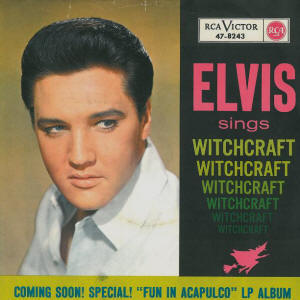
On October 1, 1963 RCA Victor released the next single of the king. Two weeks later "Bossa Nova Baby" entered the "Hot 100" at number 77, "Witchcraft" was listed at number 72. "Bossa Nova Baby" had a run of 10 weeks and peaked at number 8, "Witchcraft" stayed for 7 weeks and made it to number 32. "Bossa Nova Baby" also peaked at number 20 of the "R&B Best Seller Chart". In 1992 the RIAA honored the domestic sales with a Gold Award. In Great Britain, the Netherlands and Germany "Bossa Nova Baby" reached the top 20, in France, Norway, Belgium and Australia it entered the top 10. Worldwide the 45 sold 2 million copies, which translates to 300 million paid streams. Even though Elvis still was successful in 1963 he wasn't able to score real mega sellers anymore. Slowly but surely another generation of stars was taking over.
Witchcraft"Witchcraft" is an excellent, uptempo popsong that also would have made a great a-side. Elvis taped it on May 23, 1963 for a new album, which finally was canceled due to the release of the greatest hits compilation "Elvis' Golden Records - Volume 3" and the "Fun In Acapulco" soundtrack. In 1968 the song was released on the album "Elvis' Gold Records - Volume 4" and once again in 1971 on the boxed set "The Other Sides - Worldwide Gold Award Hits Volume 2".

To coincide with Paramount's release of "Fun In Acapulco" RCA Victor started to ship the accordant soundtack album in early November 1963. On December 21st the record entered the "Top LPs Chart" for 24 weeks and reached number 3. Worldwide "Fun In Acapulco" was retailed 3.25 million times, which translates to 487.5 million paid streams of the complete album or 4.88 billion streams of individual tracks. Therefore the soundtrack beat the previous studio albums, but nevertheless RCA, Colonel Parker and Elvis had to admit that the latest "Golden Records" release and the previous Paramount albums had done better.
Love Me TonightElvis recorded the ballad on May 26, 1963 at RCA Studio B in Nashville/Tennessee for an album, that later would be canceled in favor of the greatest hits compilation "Elvis' Golden Records - Volume 3" and this soundtrack lp. As the title suggests, a lady is to be seduced. In contrast to most of the ballads the king recorded in the early 1960s he doesn't croon and sing in his higher register, but uses his voice to the full extend and sings comparably low. The writer of this very good love song is Don Robertson.
Slowly But SurelyThe album closes with a popsong in midtempo by Sid Wayne and Ben Wisman. Elvis recorded it on May 27, 1963 within five takes. Two years after the release on the "Fun In Acapulco" album the track was used by Allied Artists in the movie "Tickle Me" and re-released by RCA Victor on the accordant soundtrack ep.
"Kissin' Cousins" / "It Hurts Me" was shipped to the stores in February 1964, on the 22nd of the month "Kissin' Cousins" entered the "Hot 100" at number 63, stayed on the chart for nine weeks and peaked at number 12. The b-side was also noted on the hitparade. Within seven weeks it climbed from number 76 to number 29. The RIAA honored the domestic sales with a Gold Award in 1992. While the single stagnated at number 27 of the German charts, it became a top 10 hit in Great Britain, Ireland and Norway. In total the record sold two million units, which translates to 300 million paid streams. Once more the sales were solid, but not as good as they used to be.
It Hurts MeThe ballad was written by Joy Byers and Charles E. Daniels and was recorded for the first time by Jerry Jackson. But because his version stayed in the vaults since 1990 Elvis can be considered the original artist. He recorded the song on January 12, 1964 at RCA Studio B in Nashville/Tennessee within five takes. Without doubt "It Hurts Me" also would have made a great a-side, but Colonel Parker wanted to promote the movie and his client consented. As written before, RCA Victor released the track on "Elvis' Gold Records - Volume 4" in 1968. But it was also included on "The Other Sides - Worldwide Gold Award Hits Volume 2" in 1971.

Even though the accordant movie had already premiered in March 1964, RCA Victor didn't release "Kissin' Cousins" before April 2nd. With 300,000 sales the album was listed on Billboard's "Top LPs Chart" for 30 weeks and peaked at number six. In 1992 the RIAA honored the US sales with a Gold Award. In Germany "Kissin' Cousins" didn't chart any higher than number 22, but in the UK the album made it up to number 5 of the lp charts. Worldwide the soundtrack sold 3 million copies, which equals 450 million paid streams. Even though "Kissin' Cousins" was a commercial success, neither RCA Victor nor Colonel Parker couldn't help to realize a slight descent of sales since 1962.
Echoes Of LoveTo get the album above the mark of 25 minutes RCA Victor included two bonus songs. They had been recorded a year before for an album project, which was finally scrapped due to a third installment of the "Golden Records" series and the soundtrack of "Fun In Acapulco". On May 26, 1963 Elvis recorded ten takes of "Echoes Of Love" at RCA Studio B in Nashville/Tennessee. The song was written by Bob Roberts and Paddy McMains and is one of the few highlights of this album.
(It's A) Long Lonely HighwayThis one was penned by Doc Pomus and Mort Shuman and recorded by Elvis on May 27, 1963 within two takes. The singer was left by his lady and now has to walk the streets of life alone. The melody is quite happy and typical for popsongs of this period. But the lyrics are unusually dark, because the narrator even threatens his ex to commit suicide. To me this is the best track of the album. In 1965 Allied Artists used the song for the movie "Tickle Me", RCA Victor released it on a single. For whatever reason they selected the first take.
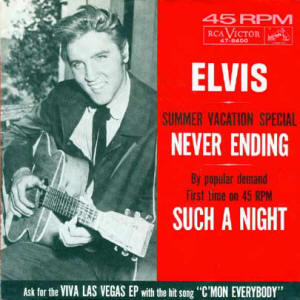
On July 14, 1964 RCA Victor issued a single of "Such A Night" and "Never Ending". On the 25th of the month "Such A Night" entered Billboard's "Hot 100" at number 82, had a run of eight weeks and peaked at number 16. In Great Britain and The Netherlands the single made it in the top 20, in Norway, Belgium, Ireland and Australia the track even hit the top 10. Worldwide the record sold 1.3 million units, which equals 195 million paid streams. Commercially the 45 was a huge success, considering the facts that "Such A Night" was available on the album "Elvis Is Back!" since 1960 and "Never Ending" was gathering dust in the vaults for more than a year.
Never EndingElvis had recorded "Never Ending" on May 26, 1963 at RCA Studio B in Nashville/Tennessee within 3 takes. The nice, uptempo popsong was written by Buddy Kaye and Phil Springer.
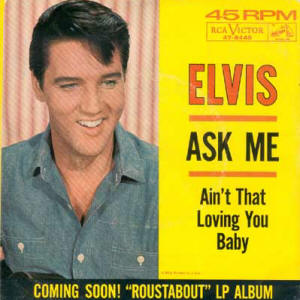
On September 22, 1964 RCA Victor released another single of the king. Both songs enterted Billboard's "Hot 100" on October 10th, but it soon turned out that the supposed b-side was more popular. While "Ain't That Loving You Baby" stayed for ten weeks and peaked at number 16, "Ask Me" was listed two weeks longer and reached number 12. In 1992 the RIAA honored the domestic sales with a Gold Award. In Canada and Australia "Ain't That Loving You Baby" became a number one hit, in Ireland and Norway the song entered the top 5. Worldwide RCA sold 2.3 million units, which equals 345 million paid streams.
Ask MeThe original version was an Italian ballad named "Io". It was written by Domenico Modugno, who was also the first one to record and release it in 1958. Bill Giant, Bernie Baum and Florence Kaye wrote English lyrics and turned it into "Ask Me". The quiet, organ-carried ballad demonstrated a more mature side of the singer and meets my taste, too. RCA Victor also released "Ask Me" on "Elvis' Gold Records - Volume 4" (1968), but put in on the second volume of the gold boxes ("The Other Sides - Worldwide Gold Award Hits Volume 2").

With "Elvis For Everyone!" RCA Victor released the first Presley album in three years that wasn't neither a soundtrack, nor a compilation of hits. On August 20, 1965 the record entered the "Top LPs Chart", stayed for 27 weeks and peaked at number 10. In Great Britain the album was released with a different cover and the Stereo version included a remake of "Wild In The Country". This edition was more successful and made it to number 8 of the UK Charts. In it's initial sales period "Elvis For Everyone!" sold 200,000 copies, in total the record went over the sales counters three million times. According to the RIAA this figure translates to 450 million paid streams of the complete album or 4.5 billion paid streams of individual tracks. Commercially "Elvis For Everyone!" was on a par with the king's studio albums of the early 1960s and did better than the recent "Girl Happy" soundtrack.
Finders Keepers Loosers Weepers"Finders Keepers Loosers Weepers" was recorded on May 26th within three takes. The uptempo popsong by Dorie and Ollie Jones is a good one and the melody stays with you.
Memphis TennesseeOn May 27, 1963 Elvis recorded Chuck Berry's "Memphis Tennessee" and planned to have it released on a single, coupled with "Witchcraft". But somehow he came to the conclusion that he could do better and decided to record the song a second time. RCA Victor released "Bossa Nova Baby" instead and Elvis tried again on January 12, 1964. He taped six takes and would have released it on a single if he hadn't played his version to Johnny Rivers, who covered it note by note and scored a number 2 hit with "Memphis Tennessee". Therefore Elvis' version stayed in the vaults. In the song the narrator asks the operator (back in those days the devices couldn't connect themselves, but an operator had to do the work manually) to connect him to Marie. At first she appears to be his girlfriend and her mother doesn't agree to the relationship, but later it is revealed that Marie is the daughter of the singer and her mother is his ex-wife. This twist is great and musically "Memphis Tennessee" also has a lot to offer. Without doubt this is one of the king's greatest recordings of the 1960s.
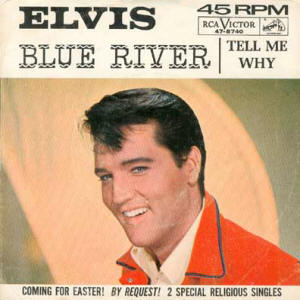
The seventh and final Presley single of 1965 was "Tell Me Why" / "Blue River" and was released on December 14th. Both songs entered Billboard's "Hot 100" on January 1, 1966. "Tell Me Why" had a run of seven weeks and moved from number 75 to number 33. "Blue River" was listed only once and just at number 95. On the domestic market the single sold 500,000 units and was certified with a Gold Award by the RIAA. The biggest success was archived in Canada, where "Tell Me Why" became a top 10 hit. Globally the 45 sold a million copies, which equals 150 million paid streams. For a single by Elvis Presley with two unreleased tracks the sales were shockingly poor.
Blue RiverElvis had put the song on tape on May 27, 1963 at RCA Studio B in Nashville/Tennessee. Take 2 became the basis of the master. Because "Blue River" was rather short, Steve Sholes repeated the final verse and a chorus in post-production. The song by Paul Evans and Fred Tobias was also released as a bonus track on the soundtrack album "Double Trouble" (1967).
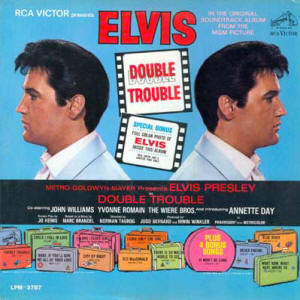
The gospel album "How Great Thou Art" was followed in June 1967 by the soundtrack of "Double Trouble", the king's forthcoming motion picture. Starting on June 20th Billboard listed the record on the "Top LPs Chart" for 20 weeks, but with sales of 200,000 units it didn't climb past number 47. Worldwide "Double Trouble" barely moved 1.6 million copies (according to the RIAA that's 240 million paid streams of the complete album, respectively 2.4 billion individual tracks) and therefore became the king's worst selling album to date.
What Now, What Next, Where ToOriginally Don Robertson had written the song for Johnny Cash, but he refused it. So it was offered to Elvis, who recorded it on May 26, 1963 at RCA Studio B in Nashville/Tennessee within a single take. I like that popsong very much, to me it's the highlight of this album. By 1967, however, the sound was already outdated. CAMDEN re-released "What Now, What Next, Where To" in 1972 on the budget album "Separate Ways".
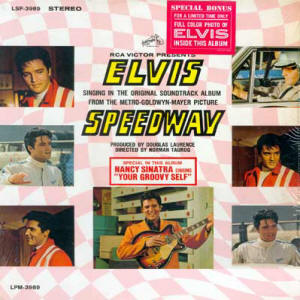
In May 1968, a month before MGM started "Speedway", RCA Victor released the accordant soundtrack album. It entered Billboard's "Top LPs Chart" on July 6th, had a run of 13 weeks and peaked at number 82. Worldwide the album sold a million units, which translates to 150 million paid streams of the complete record or 1.5 billion paid streams of individual tracks. Thereby "Speedway" replaced "Double Trouble" as the king's worst selling album.
Western UnionWhen the album was released "Western Union" had been in the vaults for half a decade. It was a leftover from May 27, 1963, when Elvis taped the song by Sid Tepper and Roy C. Bennett within four takes. The tune is reminiscent of "Return To Sender". Once again the singer had a quarrel with his girlfriend and apologizes with a written note - this time transferred by Western Union.
